…and here are my fellow platforms and operating systems. The sample below shows just a few; click the image below to see the full set, which concludes with Windows Vista. Possibly not safe for work — male bottomlessness and female toplessness lurk within!
The phone functionality of the iPhone has been the least interesting thing to me, especially given:
- The “not-yet” availability of iPhone service here in Canada
- The ridiculously high cost mobile data rates here in Canada
- The fact that I have a perfectly good phone — a rather nice Motorola KRZR that I got only earlier this year
I care even less about its built-in camera. I’m one of those guys who carries a half-decent point-and-shoot digicam wherever I go, and until phone cameras get better, I’m going to stick with my Lumix.
For me, the really interesting things about the iPhone have been the functions that are currently performed by my trusty Powerbook and iPod nano:
- Its PDA-like features
- Audio and video playback
- WiFi and Safari
The web browser has been of particular interest to me. In the age of Web 2.0/Ajax/web applications/whatever you want to call it, having net access and a browser as fully-featured and good-looking as Safari makes the iPhone the mobile computing platform that tablet computers wish they were.
If only the iPhone didn’t come saddled with the phone (and the commensurate cost)…
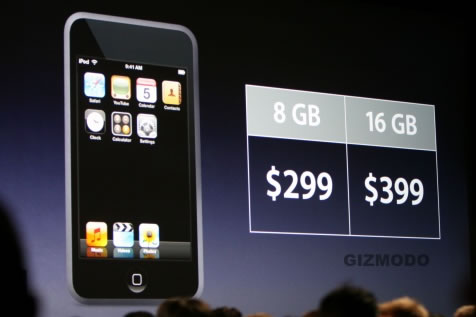
Photo courtesy of Gizmodo Live.
My wish has been granted! At the “The Beat Goes On” event held today, Steve Jobs announced the iPod Touch, which for all intents and purposes is the iPhone minus the phone and camera. There are two models:
- An 8GB model selling for US$299
- A 16GB model selling for US$399
I’m sure you’re going to see lists of its features all over the Web, so I’ll skip that part. Instead, I’ll simply list some thoughts on this nifty new gadget:
- That pre-emptive Zune price drop looks pretty pathetic now. I’m reminded of Sean Connery’s line from The Untouchables: Microsoft just brought a knife to a gun fight.
- Early iPhone adopters who got the 4GB might get that IIvx’d feeling. The Mac IIvx is a special computer in Mac lore in that it was a machine that was undone by cost-saving shortcuts and getting discontinued a mere 4 months after its release. People who shelled out US$600 for the 8GB iPhone might be annoyed that a mere 2 months later, the price has been dropped to $399. However, that very special IIvx feeling is for people who bought the 4GB model, which I assume will be discontinued.
- Remember what Steve Yegge wrote about JavaScript? To referesh your memory:
“JavaScript is probably the most important language in the world today. Funny, huh? You’d think it would be Java or C++ or something. But I think it just might be JavaScript.”
Given that the iPod Touch is a very portable Ajax platform and likely to influence the design of other mobile browsers, if JavaScript wasn’t the most important programming language in the world when Steve said so, it is now.
- Remember the promise of tablet computers? It just got much closer to being fulfilled, if in an unexpected way.
…you either kept a phone list, a Rolodex or if you were really on the cutting edge, you used one of these:
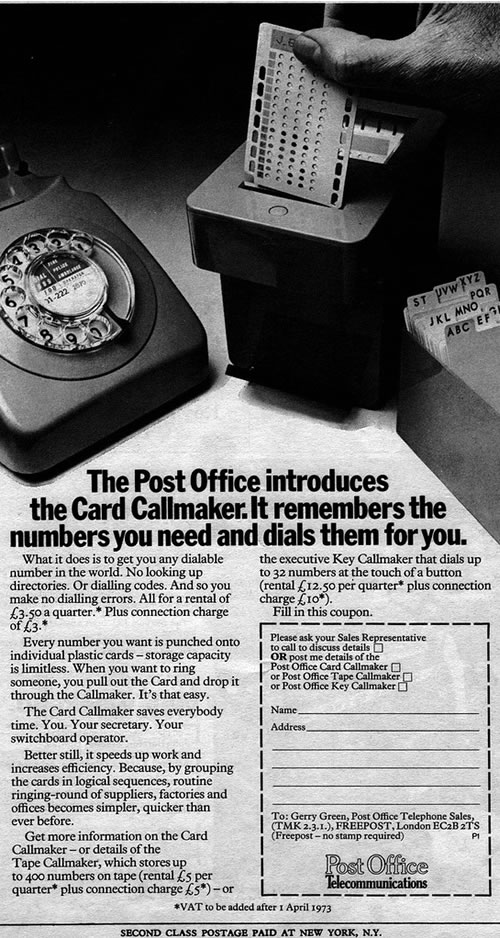
Click the image to see it at full size.
Image courtesy of Miss Fipi Lele.
Helvetica, the Shirt
Share your love for the Helvetica typeface with the Helvetica shirt! For the purist, there’s the version set in Helvetica:
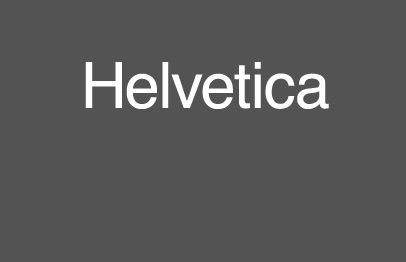
Those of you who like challenging people or separating the typeface players from the wannabes might prefer the version in Arial:
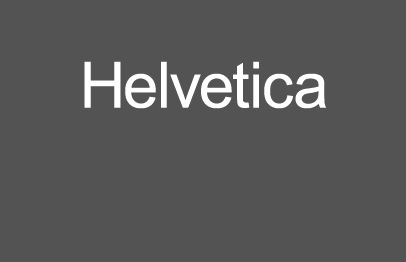
Into making ironic statements via t-shirts? The Cooper Black version is the one for you:
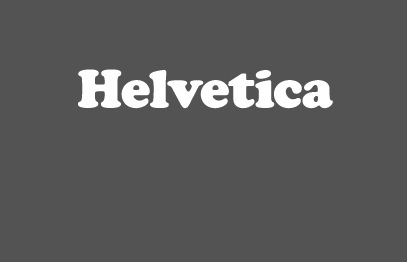
And if you just want to start a fist-fight with some font nerd, you want the Comic Sans version, which will be available soon:

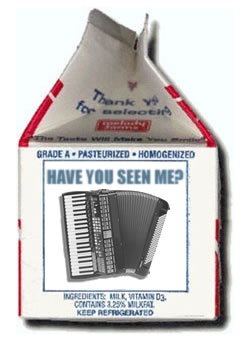 I’m experiencing some server issues with my personal blog, The Adventures of Accordion Guy in the 21st Century right now. I’m currently in the process of trying to get a server upgrade and hope to have the ol’ blog up and running soon.
I’m experiencing some server issues with my personal blog, The Adventures of Accordion Guy in the 21st Century right now. I’m currently in the process of trying to get a server upgrade and hope to have the ol’ blog up and running soon.
Python 3000 Alpha 1 Available Now!

If there’s an Andre 3000 and a Python 3000,
why not a Guido 3000?
It’s been a long-time topic of discussion in the Python camp: Python 3.0, also known colloquially in the Python community as “Python 3000” or “Py3k”, and today it got a little more real. The first alpha release of Python 3000 is now available for download, just in time for those of you who want to test-pilot it over the Labor day weekend.
(If you’re waiting to get a final version before downloading, you’ve got a fair bit of time. The current best estimate for the release date of that version is August 2008.)
Unlike Perl 6, which is a radical reworking of the language, where every feature is subject to change, the idea behind Python 3000 was correct a specific set of design mistakes. These corrections are large enough that they will break programs written in existing versions of Python, but which provide gains that are enough to make the trade-offs worthwhile.
If you’re curious about Python 3000, here are some links you might want to check out:
- The announcement in Guido van Rossum’s blog
- What’s New in Python 3000. This is a work in progress, so many sections of this document aren’t filled in yet.
- Guido’s Python 3000 presentation rehearsal [video, 1 hour, 7 minutes]. This is a Google video of Guido giving his Python 3000 presentation for OSCON a test run in front of his co-workers at Google.
- Python 3000’s Wikipedia entry.
- Source tarball for Mac OS X and Linux users. I just finished the “configure/make/make install” dance and Python 3000 is now working on my G4 PowerBook running Tiger without a hitch.
- MSI installer for Windows users.
The Facebook development articles continue at the Tucows Developer Blog, this time with Using the FacebookRestClient Class’ “Photo” Methods, Part 3: photos_getTags.


